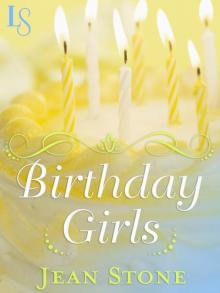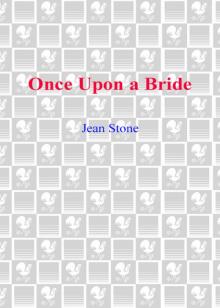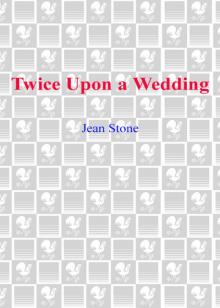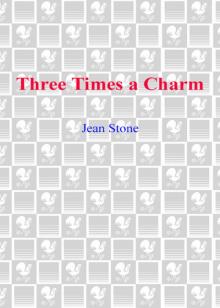- Home
- Jean Stone
Beach Roses Page 6
Beach Roses Read online
Page 6
She should have felt some satisfaction in what he said; that it had been unnecessary for Evan to deceive her and drag her into Boston, that this doctor would have handled her treatment the same as Doc. But as they left the office and went down the elevator and walked the long, long corridor, all Hannah could think of was what the doctor said: Your tumor has only shrunk a small percent. By now, we would have hoped for more.
And then his other words: The trick is not to get discouraged.
She hadn’t been discouraged, until right now, when suddenly she realized her anger had dissipated; in its place was left a space that was empty and afraid. With an involuntary motion, Hannah steadied herself against her husband’s arm.
They walked some more in silence, and when they reached the front door of the hospital, she saw the falling snow: it swirled and whirled around the windows, and a dangerous accumulation was already on the ground.
At the end of the driveway, Katie said, “Right here.”
Rita turned onto the rutty, dirt-packed path. She wondered if Katie was clenching her jaw as tightly as Rita was clenching hers.
“My mother doesn’t go out much,” Katie said.
Rita nodded because it seemed impolite to say, “Yes, I know. The whole island knows she’s pretty much a recluse.” She maneuvered the van within ten or twelve feet from the door. She wondered how many people had ever come that close to the place where Joleen lived.
Rita parked the car. They sat a moment.
“Would you like me to go in with you?” Rita asked, because, though she was positively dying to, she knew she shouldn’t interfere. Still, to have a glimpse inside …
Before Katie replied, the back door opened. Rita clenched again.
It was Joleen.
The great Joleen.
She was older. Well, of course she was. Her hair was long and tied back from her face. It was no longer shining auburn, that polished, bronzy color that had graced so many album covers. It was now rather dull, a tapestry of gray and brown. From where Rita sat, she could see the slight sag of eyelids and of jowls, the unkempt wrinkle of the long cotton skirt and the thick black sweater that the woman hugged around her waist.
But still she was a star.
She stood with self-assuredness; she was steady; she was serene.
And then, she strode toward the minivan.
Rita did not move, but her eyes followed every step the woman made. When Joleen reached the passenger door, Katie touched the handle, then she stopped.
“Kathryn,” Joleen said from the other side of the closed glass.
For another moment in which Rita and the world came to a speechless halt, Katie paused. Then, at last, she opened up the door.
“Kathryn,” Joleen repeated, and then Rita clearly heard the throaty, legendary voice that she recalled so well, “I’ve been hoping you would come.”
SIX
The house was modest, much like Rita and Charlie’s house, which had been left to Hazel long ago by a dead but appreciative lover; the same house where Rita had been raised, then Kyle, and now the rest of them. Katie had not been raised in Joleen’s cozy cottage, but only spent sporadic weeks there as a young child, in between private schooling in Manhattan and her mother’s tours. Katie hadn’t said as much, but Rita had always paid attention to the news, especially news about Joleen. There hadn’t been much news for several years, except mentions of Joleen’s watercolors and how they looked a lot like other people’s.
Joleen invited her inside.
“Oh …” Rita said, fumbling with her words. After all, this was Joleen. How lucky could Rita get? “I won’t intrude. I’ll run along.”
“Please come in, Rita,” Katie said, and Rita recognized a plea for some support, which was what she’d promised Doc, wasn’t it?
“How about some hot chocolate?” Joleen asked after they were situated inside the house.
Katie paused as if to survey her surroundings. “Sure,” she said at last.
“Sure,” Rita echoed quickly. She nudged Katie farther into the kitchen, then did not stop her eyes from making their rounds around the room that was beige and blue like sand and water. A huge vase of colorful spring flowers stood on a small, white table in a corner.
“Hard to believe it’s snowing,” Joleen said, taking three pottery mugs from the cabinet. Using a paper towel, she wiped them out as if they’d not been used in quite a while.
“A nor’easter, they’re saying,” Rita said. There were no dishes piled in the sink, no stacks of old newspapers collecting Vineyard dust. Rita felt oddly comforted that the recluse kept her house neat and pretty despite, word had it, that she never entertained.
“Snow in April. Can you imagine?” Joleen replied, and Katie simply stood motionless, more like the guest that Rita was.
Rita moved to the cozy dining area that had been converted to a sunroom. It overlooked the water. Another large pot of flowers sat by a window seat. Perhaps tulips and daffodils were Joleen’s friends. “What a great view,” Rita said. “I used to be in real estate. I could have easily sold this house.”
Just then, Katie walked in front of Rita and leaned against the window seat. “I used to love to sit here and watch the boats go by,” she said. “Especially the big ferries. Back and forth. Bringing all those people, then taking them back home.”
Behind them, Rita heard the filling of a teakettle, the rattle as it was set upon the stove, the pouf of the gas jet as it ignited.
“And so one finally brought you home,” Joleen said from across the room.
Rita did not mention that Katie had most likely come by plane. She angled to one side so she would not be standing directly between mother and daughter, in the line of friendly fire, so to speak. She wished she could tell if the tension in the room was real or her imagination.
Katie kept her eyes fixed on the sea, her back toward Joleen. “I have breast cancer,” she said.
Rita cringed.
“I know. Your father told me.”
“He called you?”
“Yes.”
“I thought you never answer your phone.”
“I have a machine now. He left a message; I called him back.”
Rita fixed her gaze on the red tulips and tried to forget what she’d just heard: Joleen never answered her telephone? She was that much of a recluse? And what difference did it, should it, could it make to Rita?
“Then you knew I left New York.”
Oh, God, Rita thought, no longer feeling lucky that she’d been invited in, but more like the antagonist in the ancient adage “three’s a crowd.”
“Your father said you came here. I made some calls; I learned you were at the Harbor View. Not many inns are open year-round.”
If only Rita could shrink like Lily Tomlin in that old movie, then she could slide beneath the door. She silently cursed Doc for putting her in this position.
“I’m pregnant.”
“Yes.”
Not that it wasn’t obvious.
“After the baby’s born I need to have radiation.”
“Your father’s worried about you.”
“He’s worried about my career. He’s worried about his future.”
Outside the window, snow fell heavily. And Rita felt her angst turn into sadness for Katie, for Joleen. No matter what Doc thought, Rita was not cut out for this.
“He loves you, Kathryn. You are his world.”
Katie folded her arms over the rounded top of her tummy. She turned to Rita and said, “Thanks for the ride, Rita. But I think I need to rest.” She disappeared out of the room and her footsteps padded up the stairs.
Rita looked over at Joleen just as the teakettle’s whistle blew.
Forty-five minutes later, Rita walked into her house with Olivia on her hip, Oliver holding on to her hand, and snow over all of them. She stumbled over See ’n Say and stopped herself from saying “Damn.” Instead, she unzipped and unbundled and called out “Nap time!” The twins miraculously agreed an
d scurried upstairs to their room, followed closely by Rita, who wished that she were younger. Thank God for Amy, who’d spent half an hour with them in the potty and layered them in clean diapers just in case she’d done it wrong.
Once they were content—as content as two-year-olds could get—Rita glanced up at the clock: plenty of time to call Doc before Mindy came home from school. Plenty of time to call and ask if there would be any more surprises and what he really expected out of her for the few million they might or might not get. She picked up the phone in the upstairs hall. She quickly placed the call.
He was in his office.
“Thanks for the kind words to my mother about the group last night, but it’s bullshit, Doc. I feel like I’ve been duped.”
“Duped?” he asked, as if he didn’t know.
Rita stretched the phone cord down the hall. “Katie Gillette. For godssake, Doc, you didn’t tell me she’d be there.” She walked a few more steps, then stopped outside Mindy’s room. Even from there, with the door partially ajar, Rita could see two of Mindy’s favorite posters, both of Katie—healthy, smiling, glittering from head to toe. Rita leaned against the doorjamb and felt the sadness return.
“The women in the group have breast cancer, Rita. They need your support, not your admiration.”
She sighed. “The older woman left,” she said. “I thought you ought to know.” Of course, Rita would love to ask if the woman was the one behind the bucks, but Doc might say that she was too damn nosy, which she supposed she was. A genetic flaw from Hazel, one of the not-so-charming ones.
“Just do the best you can, Rita,” Doc was saying now. “That’s all anyone can ask.”
She closed her eyes but still could see the glitter in her mind, Katie’s glitter, that hung on Mindy’s wall. “Doc?” she asked, because he’d sworn her to damn secrecy and she couldn’t even ask Hazel, if Hazel ever made it across town from the Senior Center in the storm. “Is Katie going to be okay? She’s pregnant, Doc. And with the breast cancer …”
“Just do the best you can, Rita,” Doc repeated. “It’s not up to you to make her well.”
He said good-bye and Rita hung up. She rubbed her forehead, then opened up her eyes. And when she did, she noticed that the door had been opened all the way. Just inside stood Mindy, her jaw slackened, her mouth agape.
Rita blinked.
“They let us out early because of the snow,” Mindy said, and stood there without moving, waiting for Rita to explain what she obviously had just overheard.
They checked into a room at the luxurious Ritz-Carlton that had a view of the Public Gardens. Evan said as long as they were snowed in, they might as well enjoy the city. Hannah didn’t want to stay, but even if they made it to the Cape, she knew the ferries never ran in a nor’easter. Still, she felt a little foolish when the doorman said that he’d valet-park the truck. She hoped he wouldn’t comment on the peat moss in the back.
“The swan boats must be frozen on the pond,” Evan said after they’d picked up toothbrushes and deodorant at the sundry shop.
Hannah didn’t tell him that the swans themselves were safely harbored on the South Shore for the winter, that they’d be brought back in May on a day of celebration. She didn’t want to tell him because she didn’t want to share things she’d learned while she’d lived in Boston; she wanted no reminders of what might have been.
“Honey,” Evan said. He had moved from the window and stood beside her now at the foot of the bed. He put his arms around her.
She stepped away from him. She folded her arms and stared at the Ethan Allen furniture and the matching fabric draperies. “Maybe you were right,” she said. “Maybe I should have come here first.” He did not disagree. She went to the window because though the room was large, there was nowhere else to go.
He was next to her again. He put his arm around her, then dropped his head onto her shoulder. “I will not lose you, Hannah. I will not lose you, too.”
She knew her husband was thinking of himself, thinking of his own pain. He’d hidden it so long, the way that she had hidden hers. “I still miss her, Evan.”
“Me, too,” he said. “She was my mother.”
Mother.
Oh, she thought, and could not fight the instinct to think about her own.
It was the perfect time to tell Evan about her mother, the woman folks said Hannah looked like her despite the fact that Hannah was fair like her father instead of black-haired like her mother. Black-haired like Riley. It was the perfect time to tell him her mother’s name and where she was and why, so if Hannah died he would know to notify her other next of kin.
She drew in a breath for courage, just as Evan began to cry. “She was so full of life,” he said. “She always seemed so healthy. The way she ran the theater …”
The perfect time had come and gone: Evan had slid into his memories and his sorrow; he would not have room for hers. So Hannah simply moved more closely up against him. He rubbed her arm and she rubbed his. Together they stood in silence at the window and watched the city turn to white.
How did one tell a twelve-year-old girl she’d be grounded for her life if she breathed one iota of what she’d heard?
Rita and Mindy stood speechless for a moment, neither one apparently knowing what to say. Then Rita remembered she was the adult, just as she was the facilitator of the support group and was supposed to be in charge. She fought off another wave of anger at Doc Hastings and simply said, “Well, I guess it’s pretty obvious I didn’t know that you were here.”
Mindy looked at her with disbelieving eyes. “Rita? Is it true?”
Rita walked past her and went into the room, ignoring the rhinestone rose tattoo that Mindy had glued to her left cheek sometime between when the school bus had picked her up that morning and when it had dropped her off. “We need to talk,” she said, and sat down on the pink blanket on Mindy’s bed that faced a trio of Katie Gillette photos in successive, onstage poses.
Grabbing the chair from the small desk in the room, Mindy sat and leaned toward Rita, her mouth still slightly open, her eyes awaiting more.
“I know you know how important it is sometimes to keep a secret,” Rita said. Love her like a kid; treat her like an adult, she’d decided long ago. “This is one of those times.” She did not say, “The last thing Katie needs is the media on her doorstep,” because the word “media” alone might tempt a twelve-year-old.
“Is she going to die? What about her baby? Is it Miguel’s?” She barely took a breath before adding, “Oh, no! What about Brady, her bodyguard? He must be devastated. Some people think he’s secretly in love with her.”
So now there was Rita, plopped in the middle of a gripping daytime soap.
Mindy spoke, of course, as if she were an intimate friend of Katie’s: The tabloids and TV and magazines had no doubt exploited the rock star for attention.
Then Rita had a thought. “It’s none of our business, Mindy. Just as it’s no one else’s business why you live with us. Like Mr. Mason at the hardware store—it’s not his business—or Jenny at the ice cream shop or Hap at the dry cleaners. Can you understand that?”
Mindy seemed to consider it.
“Katie is going through a rough time right now,” Rita continued. “We need to respect her privacy the way yours should be respected.”
Mindy fiddled with the rhinestone rose. “But Rita, it’s so awful.”
Rita nodded. “Yes. Which is why I promised Katie and Doc Hastings that I wouldn’t tell anyone. A promise is a promise, Mindy. I’m sorry you overheard me, because that means you have to keep that promise, too. Can you?”
Mindy shrugged.
“Mindy?”
“I guess,” the girl replied.
“No guessing allowed. We don’t want to hurt her, do we?”
Mindy blinked. “No.”
“It’s a big responsibility.”
“Yes.” One of the rhinestones peeled off in Mindy’s hand.
Rita stood up and kiss
ed the top of Mindy’s head. “Please,” she said. “I’m counting on you.” Then she left Mindy’s room, hoping that a half-baked promise would not succumb to the pressures of being twelve.
“Mommy! Mommy!”
It was Dana’s voice, crying out from somewhere beyond the blurred horizon, caught upon a wave, trapped in its fierce wake.
Faye’s eyes shot open. The first thing she realized was that she was in a pool of sweat and her heart was racing quickly and her breath was short and shallow.
She let out a mournful wail. Mouser jumped onto the bed and placed his paws beside her and stared at her. She pulled the covers over her face and waited for the pain to go away.
When it did not, Faye crawled from the bed and stepped into her slippers. With the big comforter around her, she went to the huge staircase where she had once descended, lady of the manor, mother of the children, wife of the husband, keeper of the fortune.
She thought that she might kill herself, but she didn’t own a gun.
She made her way into the living room and slowly built a fire. Mouser did not leave her side.
“She’s dead,” Faye said, maybe to the cat, or maybe to hear the words out loud, as if repeating them would make them somehow more real. But it had been ten years, and Faye had said the words hundreds of times, and still they did not ring true.
She stoked the fire, then made a nest out of the comforter and curled up in it on the floor.
It had not been Greg’s fault, though he had wound up with the blame. Older brother, wiser. Should have taken better care.
The fire snapped and cracked and Faye listened to its sounds and let herself remember what was easy to forget when she was immersed in work, drowned in being busy, for lack of a better word.
Dana had been drinking. Though she was only seventeen, it hadn’t been the first time. Too much money, Faye surmised. Too many spoiled friends like she was; too few rules from a mother who was too busy with her career and a father who was too busy chasing other women when the mother was at work.

 A Vineyard Morning
A Vineyard Morning A Vineyard Summer
A Vineyard Summer A Vineyard Crossing
A Vineyard Crossing A Vineyard Christmas
A Vineyard Christmas Beach Roses
Beach Roses Off Season
Off Season Birthday Girls
Birthday Girls Once Upon a Bride
Once Upon a Bride Places by the Sea
Places by the Sea Trust Fund Babies
Trust Fund Babies The Summer House
The Summer House Tides of the Heart
Tides of the Heart Sins of Innocence
Sins of Innocence Four Steps to the Altar
Four Steps to the Altar Twice Upon a Wedding
Twice Upon a Wedding Three Times a Charm
Three Times a Charm